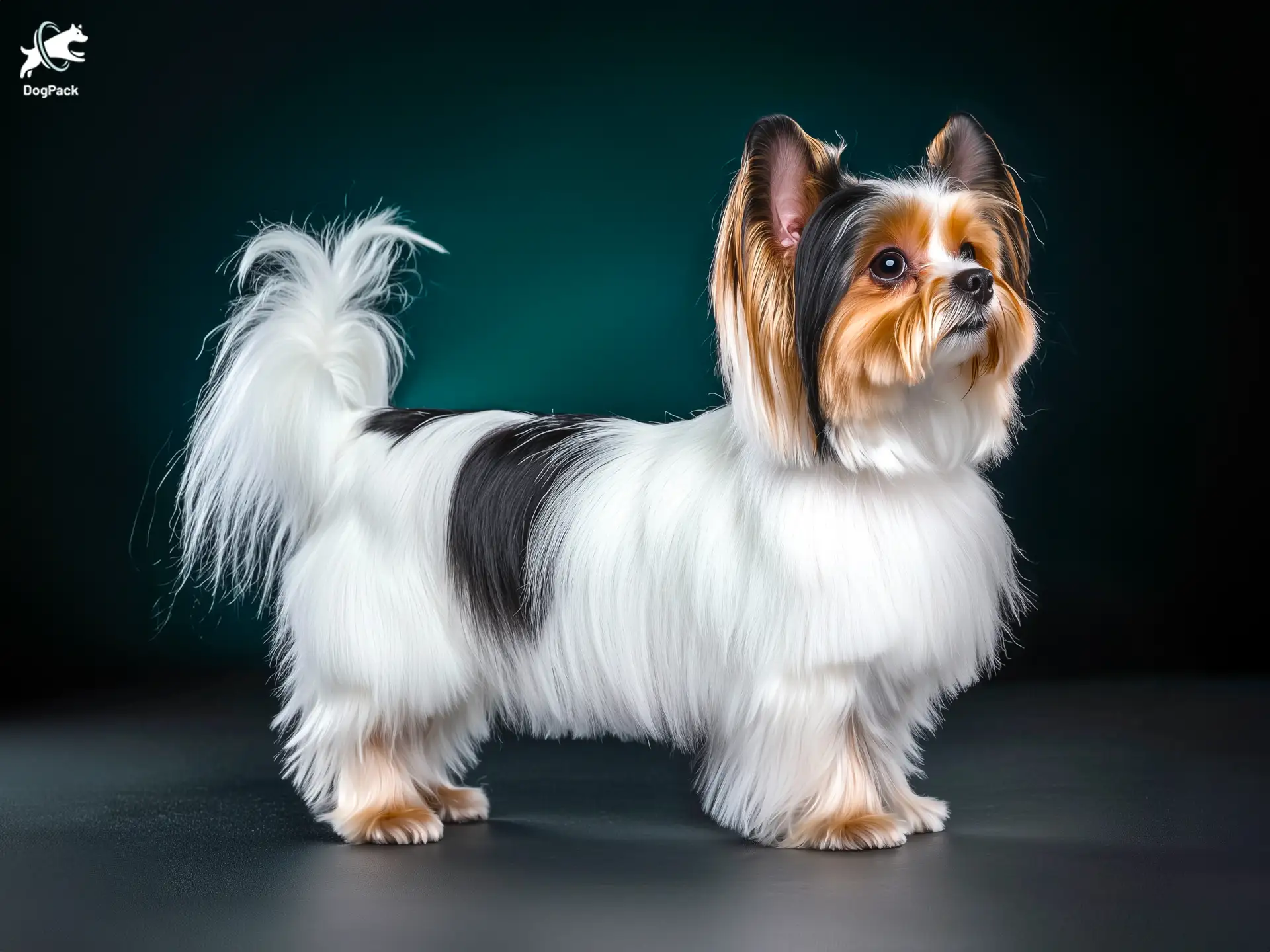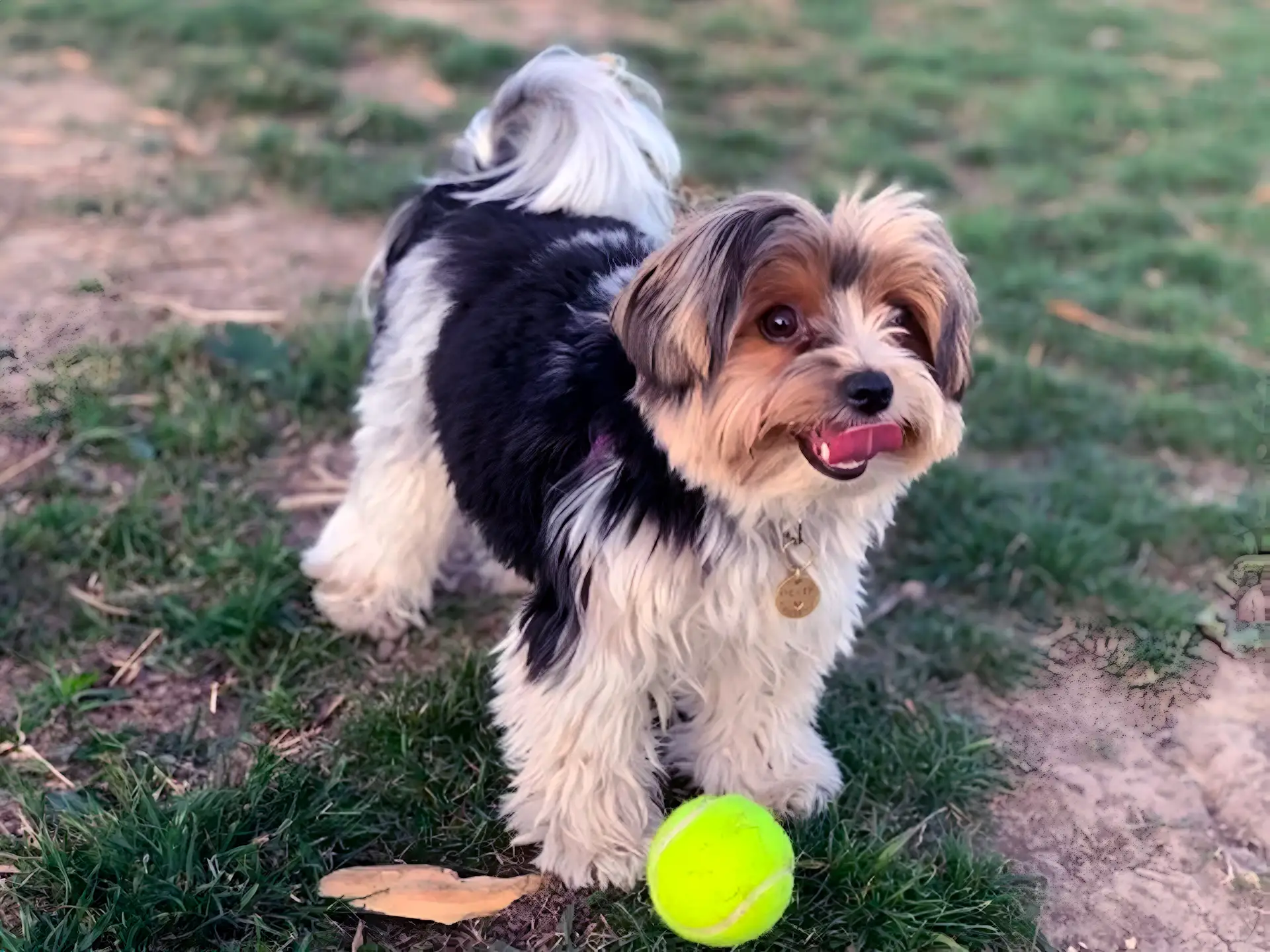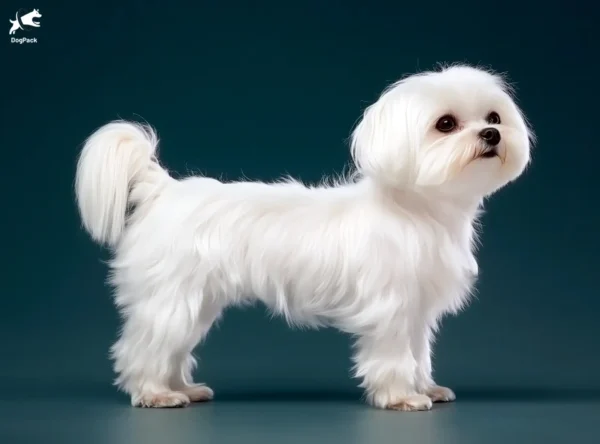Biewer Terrier Dog Breed Info & Overview
The Biewer Terrier, with its tri-colored silky coat and playful charm, is a hidden gem among small breeds. Originally from Germany, this delightful dog has won over families and individuals alike. Known for their affectionate nature and elegance, Biewer Terriers bring joy and companionship to any household, making them a breed worth discovering.
Characteristics
Pictures
Breed History
The Biewer Terrier’s story begins in Germany in 1984 when Werner and Gertrud Biewer, Yorkshire Terrier breeders, discovered a unique puppy with a piebald gene resulting in a striking tri-colored coat. Enthralled by this distinctive appearance, they dedicated themselves to developing a new breed.
Initially called the Biewer Yorkshire Terrier à la Pom Pon, the breed quickly gained popularity in Europe due to its charming looks and delightful personality. The Biewers focused on breeding for the tri-color pattern, setting the foundation for the breed standard we recognize today.
After making its way to the United States, the breed caught the attention of enthusiasts and was eventually recognized by the AKC Foundation Stock Service in 2014. In 2021, the Biewer Terrier was fully accepted into the Toy Group, solidifying its status as a distinct purebred breed.
Temperament, Personality
Biewer Terriers are known for their affectionate and devoted nature. They thrive on human companionship and love being the center of attention. Their cheerful disposition makes them excellent companions who can brighten up any household.
These little dogs are intelligent and curious, often exhibiting a playful side that can be quite entertaining. They get along well with children and other pets when properly socialized, making them a great addition to family life.
While generally friendly, they can be a bit reserved around strangers at first. Early socialization helps them become more confident in new situations. Their alertness also makes them good little watchdogs, as they’ll happily alert you to any visitors.
Physical Characteristics
The Biewer Terrier is a small, elegant dog with a long, silky coat that flows straight down the sides of its body. One of its most distinctive features is the tri-colored coat, typically white, blue, and gold, which sets it apart from the traditional Yorkshire Terrier.
Their eyes are dark and expressive, radiating warmth and intelligence. They have a compact body structure, with a level topline and a high-set tail that often carries a plume of hair, adding to their graceful appearance.
Standing at 7 to 11 inches tall and weighing between 4 to 8 pounds, they are truly a toy breed. Despite their small size, they carry themselves with confidence and an air of importance that belies their stature.
Health Issues
Like all breeds, Biewer Terriers can be prone to certain health issues. Patellar luxation, where the kneecap dislocates, is a common concern in small breeds and can affect their mobility if not addressed.
Another potential issue is Portosystemic Shunt (PSS), a liver condition that can affect toxin filtration. Regular veterinary check-ups and early detection are crucial in managing this condition effectively.
Dental health is also important, as small breeds can be prone to periodontal disease. Routine dental care, including brushing and professional cleanings, can help prevent issues down the line.
Grooming Needs
The Biewer Terrier’s long, silky coat requires regular grooming to keep it looking its best. Daily brushing is recommended to prevent tangles and mats, especially if you choose to keep the coat long.
Their low shedding makes them suitable for those looking for dogs that don’t shed. Many owners opt for a “puppy cut” to make maintenance easier, which involves trimming the coat shorter. Even with a shorter coat, regular grooming sessions are essential to keep their skin and hair healthy.
Bathing should be done every few weeks using a gentle dog shampoo to maintain their coat’s shine. Don’t forget to check and clean their ears regularly to prevent infections, and keep their nails trimmed.
Exercise Requirements
Despite their small size, Biewer Terriers enjoy staying active. A daily walk of about 30 minutes, coupled with some playtime indoors or in a secure yard, will keep them happy and healthy.
They are quite adaptable and can thrive in apartments as long as they receive sufficient mental and physical stimulation. Interactive toys and puzzle feeders can help keep their intelligent minds engaged.
Be cautious not to over-exercise them, especially in extreme temperatures. Their small size makes them susceptible to overheating and cold, so moderate activity levels are ideal.
Training Tips
Biewer Terriers are intelligent and eager to please, which makes training a rewarding experience. Positive reinforcement techniques like treats and praise work best with this sensitive breed.
Consistency is key, as they can be a bit stubborn at times. Early socialization and obedience training will help them develop into well-rounded adults who are comfortable in various environments.
House training can take some patience, as with many small breeds. Establishing a regular routine and being attentive to their signals will aid in the process.
Nutrition, Diet
Feeding a high-quality dog food appropriate for small breeds is essential for the Biewer Terrier. They typically require about ¼ to ½ cup of dry food per day, split into two meals.
Due to their small size and energy levels, their diet should be rich in protein and healthy fats to support muscle development and coat health. Consult your veterinarian to tailor a diet specific to your dog’s needs.
Be mindful of overfeeding, as obesity can lead to health issues. Treats should be given in moderation, and human foods should be avoided unless approved by your vet.
Adoption, Breeders
If you’re considering adding a Biewer Terrier to your family, seek out reputable breeders who perform health screenings on their breeding dogs. This helps ensure you’re getting a healthy puppy.
Rescue organizations specific to the breed are also an option. The Biewer Terrier Club of America can be a valuable resource for finding both breeders and rescues.
Avoid purchasing from pet stores or online sellers who cannot provide health certifications or allow you to meet the puppy’s parents. Doing thorough research will lead you to a happy and healthy companion.
Family Pet?
Biewer Terriers make excellent family pets due to their affectionate and gentle nature. They form strong bonds with their human family members and enjoy being involved in daily activities.
They are generally good with children, especially when raised together. However, due to their small size, supervision is recommended to prevent accidental injuries during playtime with young kids.
These dogs also get along well with other pets when properly socialized. Their friendly demeanor makes them a harmonious addition to multi-pet households.
Right For You?
If you’re looking for a loving, adaptable companion, the Biewer Terrier might be the perfect match. They are well-suited to apartment living and can adapt to various lifestyles.
First-time dog owners will appreciate their manageable size and trainable nature. However, be prepared to invest time in grooming and providing the attention they crave.
Ultimately, if you can offer a loving home and meet their care needs, this delightful breed will reward you with endless affection and companionship.
Conclusion
With their charming looks and affectionate personality, the Biewer Terrier is a delightful companion for those who can dedicate time to their care. They thrive in loving environments where they are considered part of the family. Whether you’re a first-time owner or an experienced dog lover, this breed offers endless joy and loyalty. If you’re prepared to meet their grooming and social needs, the Biewer Terrier could be the perfect addition to your home.
FAQs
-
Are Biewer Terriers good for people with allergies?
Yes, Biewer Terriers are considered hypoallergenic due to their low-shedding coats, making them a suitable choice for people with mild pet allergies. However, it’s always best to spend time with the breed to ensure you don’t have a reaction.
-
Do Biewer Terriers bark a lot?
Biewer Terriers can be vocal, especially if they are bored or not adequately trained. Early training and socialization can help manage excessive barking. Providing mental stimulation and exercise also reduces unwanted noise.
-
How much does a Biewer Terrier puppy cost?
Biewer Terrier puppies can be quite expensive due to their rarity, often ranging from $1,500 to $3,000 or more. Prices vary based on breeder reputation, pedigree, and location.
-
Are Biewer Terriers easy to travel with?
Yes, their small size makes Biewer Terriers excellent travel companions. They fit comfortably in carriers and adapt well to new environments, provided they are with their trusted human.
-
What kind of toys do Biewer Terriers like?
Biewer Terriers enjoy interactive toys that stimulate their minds, such as puzzle toys and small fetch items. They also appreciate soft toys they can carry around and snuggle with.
Breed Ratings
Biewer Terriers are quite smart and quick to learn new commands, especially when positive reinforcement is used.
This breed loves to play and can be quite entertaining with their playful antics, making them great companions.
They have a moderate energy level, needing daily activity but also enjoying cuddle time on the couch.
Low shedding makes the Biewer Terrier a good choice for those who prefer a cleaner home.
They have a low to moderate prey drive but may chase small animals if not properly trained.
Their long, silky coat requires regular grooming to prevent mats and tangles, so be prepared for upkeep.
Intelligent and eager to please, they respond well to consistent, positive training methods.
Biewer Terriers prefer company and may experience separation anxiety if left alone for long periods.
They can be somewhat vocal, alerting their owners to new sounds or visitors.
Minimal drooling is a plus, making them a tidy indoor companion.
Generally friendly with other dogs, especially when socialized early in life.
With proper care and regular vet visits, they are generally a healthy breed with a good lifespan.














